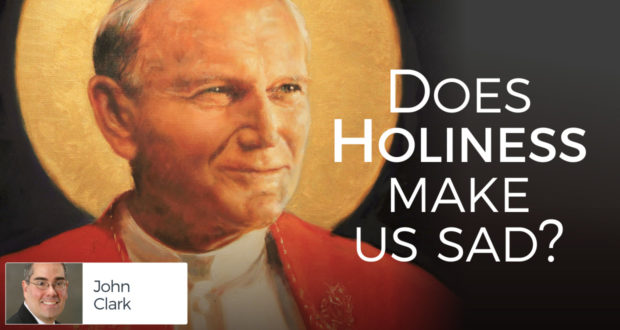Since her earliest moments, the Church has proclaimed that all men and women, regardless of profession or state in life, are called to holiness. Unlike the priesthood (to which some are called), with holiness, all are called. Yet, like the priesthood, few seem to be chosen.
Why is that? Why do we find the call to holiness so difficult to answer?
Though there may be various answers, many center on the question of happiness—meaning that holiness seems like the kind of thing that would eat into our personal happiness.
For instance, holy people seem to do things like say the rosary every day, fast on Fridays, wear long dresses, and stand in Confession lines a lot. With all that praying, fasting, and long-dress-wearing, how could they possibly be happy?
It seems like holiness would make us change some of the things that we say and do—and we like some of the things that we say and do. As Supreme Court Justice Oliver Wendell Holmes once quipped: “Fresh air and innocence are good if you don’t take too much of them, but I always remember that most of the achievements and pleasures of life are in bad air.”
I suspect that Holmes was, perhaps, speaking for the majority.
To be fair, we want a little holiness. But even if we admit that holiness is a cure, we immediately hunt for dosage labels, lest we take too much.
Many of us want to live in the grey area between sin and holiness. To borrow a phrase from Rod Serling, we want “the middle ground between light and shadow.” We’re convinced that the maximum level of personal happiness lies not in the center of holiness, but in its penumbra.
We want to be outliers to holiness. The problem is that if you desire to be an outlier to holiness, you probably will be.
Our thought process is often predicated on the idea that holiness might make us sad. However, it is the lack of holiness that saddens us. Our faith teaches us that the main sadness of Hell is the separation from God. What’s more immediately obvious is that the sadness on earth happens for the same reason.
Because we sometimes consider the relationship between holiness and happiness to be contradictory, we condition ourselves to think that holiness is something that happens after our lives here on earth—certainly not before. But on this matter it’s worth considering a quote from The Great Divorce, in which C. S. Lewis writes:
…(A)t the end of all things, when the sun rises here and the twilight turns to blackness down there, the Blessed will say “We have never lived anywhere except in Heaven,” and the Lost, “We were always in Hell.” And both will speak truly.
Lewis observes that one either begins to appreciate the things of Heaven—or fails to appreciate them—well before Judgment. Our holiness-induced happiness is a prelude to Paradise.
Jesus wants us to hunger and thirst for holiness, and if we do hunger and thirst, we shall see God. But if hungering for God means seeing Him, our occasional craving indicates that we want only to peek at God. But one either sees God or does not. There is no peeking.
As with mercy, Jesus offers us an ocean of holiness, yet we are content with a mere drop. We need to want more. We need to want God. We need to desperately desire holiness. Saint Thomas defines holiness as “the virtue by which we make all our acts subservient to God.” In other words, holiness means wanting to be with God. And not only is God the source of all holiness, He is the source of all happiness.
That is why holiness makes us happy.
St. Jerome wrote that there was a time when the world groaned and found itself Arian. Today, the world groans and finds itself groaning.
Today’s newspaper headlines evidence unhappiness in our world, and those pages tell another story: the rejection of holiness. We cannot easily change the world, but we can change our own story. We can be holy. The call of holiness is answered by keeping the commandments, by being faithful and true to our state in life, and by nurturing a life of prayer, fasting, and sacrifice.
Holiness also allows us to enjoy friends and family, to enjoy this wonderful world and the legitimate pleasures of this life that God grants us. Holiness allows us to be happy.
Pope St John Paul II painting CC Fr Lawrence Lew O.P.

 Seton Magazine Catholic Homeschool Articles, Advice & Resources
Seton Magazine Catholic Homeschool Articles, Advice & Resources
